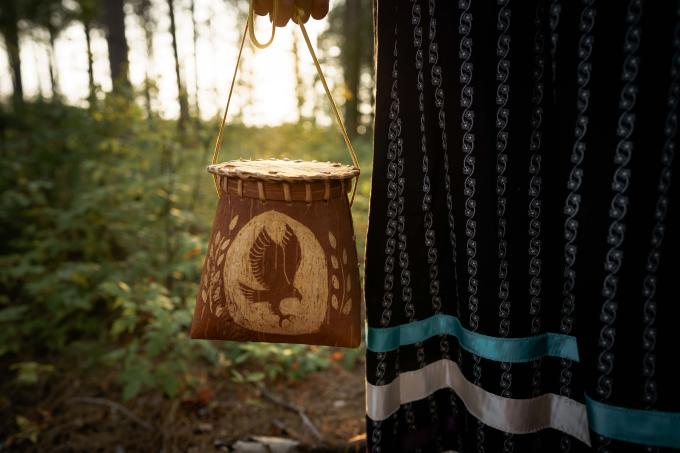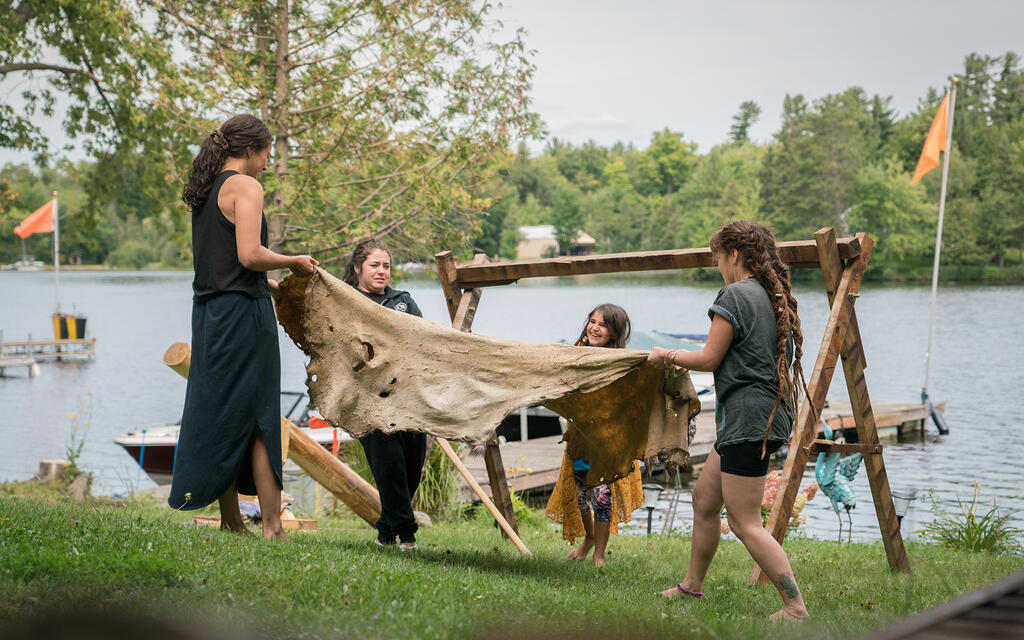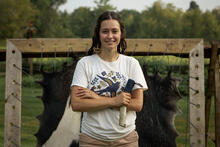This content is part of the broader Our Connections campaign, and is intended to broaden the understanding of Indigenous peoples, their cultures, and their histories in Ontario’s Highlands.
Canada is home to more than 630 First Nations, representing over 50 sovereign nations with their own lands, culture, language, creation stories, language or dialect. With such a broad representation in our country it’s natural to want to learn more about First Nations’ culture and people.
Learning how to be an ally to First Nations peoples is moving one step closer to eliminating prejudice and racialized disparity between cultures in Canada. The news is full of information about how Indigenous peoples in Canada have been harmed through genocide and settler colonialism, but it often falls short of identifying how we can be a support to First Nations peoples as they grapple with the reclamation of their culture.
Amber Hein is Algonquin Anishinabek, an original inhabitant of Turtle Island, known today as North America. The traditional homelands of the Algonquin people are the Kitchissippi watershed, presently called the Ottawa River, spanning from Mattawa to Hawkesbury.
Read Amber’s thoughts below on the many ways we can all be a better ally to First Nations peoples – beginning today.
Understand Pan-Indigenous and Why its Harmful
It is harmful to categorize First Nations' culture in Canada as one because it assumes that we are all the same and erases the unique identities of hundreds of groups of people that have existed for thousands of years prior to European contact.
A good place to begin being an ally to First Nations is to find out whose traditional territory you are residing on and whose stolen land you have benefited from. Acknowledging these nations specifically shows respect and a cultural understanding of Canadas complex history with Indigenous people.
These resources are a good place to start to find this information.
Cultural Appropriation vs. Appreciation
Know the difference! Cultural appropriation occurs when a dominant culture takes from another culture that is experiencing oppression. One example of cultural appropriation is dressing up for Halloween as a native person. Our culture is not a costume.
This is harmful because it dehumanizes First Nations people and creates a stereotype, often one that is hyper-sexualized. The hyper sexualization of First Nations’ women directly contributes to the ongoing Missing and Murdered Indigenous Women, Girls, and Two-Spirit People (MMIWG2S) crisis.
Another example of cultural appropriation is the trend of wearing a headdress or warbonnet to music festivals. This devalues an item of great cultural significance to First Nations. Cultural appropriation can be difficult to recognize and unpack. There are certainly exceptions and if you find yourself questioning a situation, please take the time to do some research so you can make an informed decision.

Support Authentic Indigenous Artwork
When purchasing traditional crafts like beadwork, dreamcatchers or art make sure the person or business you are purchasing from is Indigenous and if possible, support local. Do not support businesses who profit from stolen culture, this is an example of cultural appropriation. Authentic Indigenous tourism is developed and delivered by Indigenous people - not about Indigenous people.
It is important to support authentic artisans because the wealth of this country has been built off stolen lands and off the backs of First Nations people through genocide and tactics of oppression and is still happening today. So much has been taken from us.
When you support local Indigenous artisans, you are literally putting food on their table. Wondering where to purchase authentic items? Attend a powwow, there are vendors who sell their work there.
Avoid Harvesting or Purchasing Traditional Medicines
White Sage is a ceremonial plant and should not be used by non-indigenous people. Sage is one of our four sacred medicines and is currently being over harvested for commercial use. Over harvesting this plant by large corporations for profit can lead to extinction.
It’s important to keep in mind that access to medicines is a privilege and that Indigenous peoples were not allowed to legally practice their culture or use ceremonial medicines until around 1951. Alternative plants, such as Rosemary, can be used by non-indigenous people to smudge or cleanse.
Note the Terms or Phrases that are NOT Okay to Use
There are many inappropriate phrases or terms that are easily unlearned if non-Indigenous peoples take the time to understand their history. These terms include Indian, Savage, Half-breed, Eskimo, Chief, Tribe. These terms can be microaggressions or unintentional discrimination and show a lack of respect and cultural competency. Please stop referring to your meetings as a powwow. When First Nations people were forced off their lands and onto reservations, powwows were a way to keep songs, traditions and ceremonies alive.
The intergenerational trauma that Indigenous peoples have endured is not something that can be easily forgotten. Correct and educate people when you experience this type of language being used. If you are corrected, please listen and do better.
Use Your Privilege to Uplift Indigenous Voices
You are responsible for becoming more ethical than the society you grew up in. Learn the definition and meaning of white privilege. You can help in the following ways:
- Use your privilege in a meaningful and impactful way.
- Amplify Indigenous and Persons of Colour's voices who are already doing the work to educate and dismantle systems of oppression.
- Have difficult and uncomfortable conversations.
- It is a privilege to be able to speak on a topic that doesn’t affect you personally, if you are corrected by a BIPOC person give them space to speak and do not become offended, try to listen and understand from a place of empathy.
- Lift the burden off the shoulders of Indigenous peoples and educate others on the history of Canada, the attempted genocide and continued oppression of Indigenous and POC.
We can do better than our past. Together, we can create a future full of love and respect for one another.







